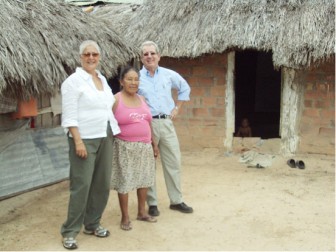The Canadian High Commission formally handed over flood-resistant flush toilet latrines to 10 households that were deemed most at risk in the Tabatinga Housing Scheme, Rupununi, following floods last June.
In a press release, the high commission said the presentation is another demonstration of the Canadian government’s ongoing commitment to aiding the health and well-being of indigenous communities in Guyana.

Raymond Drouin, Counsellor (Development) Head of Development Cooperation at the mission, presented the facilities to the community on Wednesday. Drouin encouraged the beneficiaries to take responsibility for future repairs and maintenance of the latrines.
According to the release, the Canada Fund for Local Initiatives (CFLI) project provided Cdn$21,050 ($4,210,000) to the Remote Area Medical Volunteers (RAM), the intermediary organization; however, it was executed entirely by the Voluntary Services Organization (VSO).
The Tabatinga Housing Scheme is an impoverished suburb of Lethem that was devastated by floods in June. “The flood destroyed or severely damaged outdoor latrines of homes in this area, many of which were poorly constructed, without scientific knowledge of water and sanitation requirements, and incorrectly located upstream of the water wells,” the release said.
As a result, the damaged latrines had become a potential source of hazard and serious risk to the health and safety of the occupants, particularly small children and the elderly.
The project activities were facilitated by the VSO on behalf of residents of the lowest road next to the Creek in the Scheme, which was the area worst affected by the floods.
The Central Housing and Planning Authority is also currently in the process of laying pipes and supplying water mains to the houses in the Scheme.
In addition, the project used local skills and labours in building the latrines to support income generation, and, at the same time it capitalised on the opportunity to train apprentices in carpentry skills and to teach them about good water and sanitation practices.
The project will be used as a pilot for improving sanitation and hygiene in other vulnerable housing areas in Region Nine, the release said.





